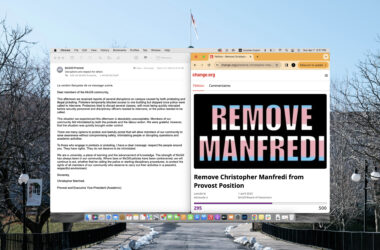McGill instructors can hold a variety of titles—Faculty Lecturer, Assistant Professor, and Associate Professor are just a few of the many positions that exist. There are tenure and tenure-track staff, contract academic staff, visiting academic staff, and Teaching Assistants (TAs) at the university. The McGill Tribune breaks down the different standings and what they mean.
What are tenure and tenure-track academic staff positions?
Academic tenure is a title that comes with prestige and job security. While tenured professors have already received this designation, tenure-track professors are seen as on the route to securing it. Within the tenure-track, one can be an Assistant Professor, an Associate Professor, or a Full Professor, and individuals move through the ranks in this order. Full Professors who hold their position for over five years, and who the university sees as having carried out their responsibilities, are afforded the additional honorific title of Emeritus.
Staff must be considered for tenure by the sixth, fifth, and fourth year after appointment to these positions, respectively. Individuals may also apply for early consideration. Each department sets its own specific tenure requirements by which candidates are evaluated. Tenured and tenure-track employees are expected to teach and conduct research, along with performing other duties for the university, as outlined by their department chair.
What are contract academic staff positions?
Contract academic staff (CAS) are not eligible for tenure and can be either full- or part-time, on definite or indefinite term appointments, and ranked or unranked.
Ranked positions include Faculty Lecturer, Senior Faculty Lecturer, Assistant Professor, Associate Professor, and Full Professor—instructors move up the ladder in that order. Ranked CAS are expected to have the same baseline qualifications as those in tenure and tenure-track positions, and must apply to be considered for promotion.
Unranked CAS positions include Academic Associate or Senior Academic Associate, Adjunct Professor, Affiliate Member, Associate Member, and Professor of Practice. Notably, some unranked positions such as Course Lecturer and Instructor fall under the umbrella of the McGill Course Lecturers and Instructors Union (MCLIU), meaning they are governed by the union’s collective agreement rather than McGill’s Regulations Relating to the Employment of Contract Academic Staff.
Who are visiting staff?
Visiting academics are invited through an official letter from the Dean and are given a finite term at McGill, usually a maximum of one year. According to the Regulations Relating to Visiting Academic Appointments, both Visiting Professors and Visiting Scholars may sometimes engage in teaching activities.
Who are Teaching Assistants?
TAs—current graduate students who aid a primary instructor by helping teach and grade—are yet another form of instructors. They are also contracted employees who are members of the Association of Graduate Students Employed at McGill (AGSEM).
What unions and associations exist?
Some of the teaching staff at McGill are unionized, while others are not. The MCLIU covers Course Lecturers and Instructors, along with some of the CAS; it does not cover tenure or tenure-track academic staff, visiting academic staff, or any ranked CAS. AGSEM covers TAs at the university. All other instructors fall under the umbrella of the McGill Association of University Teachers (MAUT), which is not a union.
MCLIU and AGSEM each emphasized the importance and positive impacts of their collective agreement negotiations with McGill in statements to the Tribune, while still pointing to a need for further progress. Both mentioned that inflation is driving up the cost of living, which they believe must be reflected in their members’ salaries. Raad Jassim, MCLIU President, confirmed that the union is working toward achieving the same pay for McGill Course Lecturers as those at other institutions receive.
“We are trying to get to that level of fairness, of compensation and reflected benefits with it,” Jassim said. “We have been in the unfortunate current situation, inflation has hit us badly and we need to know that this will also be considered going forward.”










Pingback: McGill instructors report inequitable employment conditions and academic precarity - The McGill Tribune